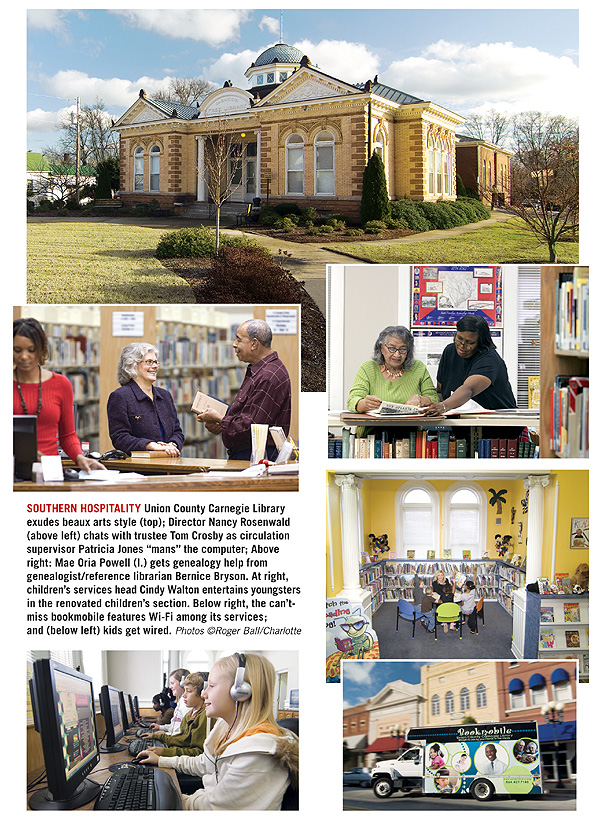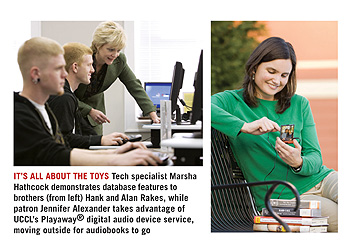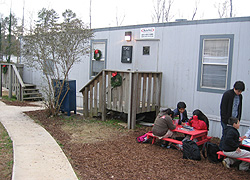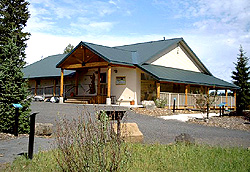2018 School Spending Survey Report
Best Small Library in America 2009: Union County Carnegie Library, SC
Carolina Dreaming
 “The scene was bleak upon my family's arrival in Union, SC, four years ago,” writes Jennifer Alexander. “The historic building was beautiful and inviting.... Our first visit was anything but.... The children's collection was old and musty. I feared that my two-and-a-half-year-old twins were making too much noise for the quiet and seemingly 'adult only' library.” But in the past three years, Alexander concludes, the Union County Carnegie Library (UCCL) has “been transformed.” The library board, selected by the county supervisors, knew something had to be done. And it was. In October 2005, the board hired Nancy E. Rosenwald as UCCL director. Longing to get back to South Carolina from western Connecticut, Rosenwald was immediately attracted to the job posting by the photo of UCCL's gem of a beaux arts Carnegie building. “I saw the picture and decided I wanted to work there,” she says. The resulting three-year transformation of UCCL was total. It changed what one observer called a kind of “selective club warehousing an out-of-date collection and occasionally functioning computers” into the “inclusive, modern, service-oriented, community center” the UCCL board sought and the winner of LJ's 2009 Best Small Library in America Award, sponsored by the Bill & Melinda Gates Foundation.
“The scene was bleak upon my family's arrival in Union, SC, four years ago,” writes Jennifer Alexander. “The historic building was beautiful and inviting.... Our first visit was anything but.... The children's collection was old and musty. I feared that my two-and-a-half-year-old twins were making too much noise for the quiet and seemingly 'adult only' library.” But in the past three years, Alexander concludes, the Union County Carnegie Library (UCCL) has “been transformed.” The library board, selected by the county supervisors, knew something had to be done. And it was. In October 2005, the board hired Nancy E. Rosenwald as UCCL director. Longing to get back to South Carolina from western Connecticut, Rosenwald was immediately attracted to the job posting by the photo of UCCL's gem of a beaux arts Carnegie building. “I saw the picture and decided I wanted to work there,” she says. The resulting three-year transformation of UCCL was total. It changed what one observer called a kind of “selective club warehousing an out-of-date collection and occasionally functioning computers” into the “inclusive, modern, service-oriented, community center” the UCCL board sought and the winner of LJ's 2009 Best Small Library in America Award, sponsored by the Bill & Melinda Gates Foundation. Start with service
The transformation began with new “strong and simple” mission and vision statements. Their promise to the Union County community served by UCCL is a lot like the statements of every good public library in America, but, in contrast, UCCL's statements say the job is done. They assert that UCCL “is the learning center for our community, the place people choose to explore ideas, the power of information and the pleasure of reading.” The library truly meets those promises. The community served is Union County, SC, all of the some 31,000 residents. The library is located in the city of Union (pop. 8,973) and serves a number of smaller communities in the surrounding rural area. Nestled in the mountainous north-central Piedmont Region of the state, the county is an hour's drive from Greenville-Spartanburg, Columbia, and Charlotte. The local economy is anchored by some small manufacturing and lumbering but nonetheless suffers from an unemployment rate of 12.9 percent. Like the rest of the state, a quarter of the population is under 18, while only about 16 percent are 65 or older. Some 68 percent are white and 31 percent African American, leaving a tiny number of Native Americans and people with other ethnic roots. Only about ten percent of county residents have a bachelor's or other degree, compared with about 20 percent statewide. Rosenwald laid out four basic strategies at the beginning of her tenure. The first was to make the staff focus on excellence in service and to make that service easily available to everyone who came to UCCL, regardless of “age, gender, race, ability, or status.” Staff were indoctrinated in the mission and vision statements. The “front” staff are still drilled in the idea that their “central mission” is customer service. They interact with the public at the circulation desk and on the floor, maintain the shelves and public areas, and provide roving reference and assistance in genealogy. Rosenwald uses teens regularly as part-time “front” staff at UCCL “because they are vibrant, enthusiastic, willing learners and teachers,” she says. “We must serve the people of this community with style, grace, and equity. Everyone should feel that this library is the place they can come to for answers.” That had not been the culture before. “I insisted that we work as a team. I asked them to think constantly about service, and I asked them to give 100 percent when they come to work...to treat every person who comes through the door as though they were a board member,” Rosenwald continues. “You know, when you welcome children to the library, they come.” Rosenwald was undeterred by staff resistance. She replaced intransigent staff with “willing learners” with experience in retail or other service industry. “Those who bought it, and many have, feel very good about it,” says Rosenwald. She points to Pat Jones, who runs UCCL's circulation department and who previously worked in retail. “She's got it, and the people love her.” UCCL staff are required to attend at least 20 hours of continuing education via classes offered by the state library, conferences, meetings, online courses, and even readings. They file short written reports on these experiences and discuss them with one another at staff training days. To bolster the service transformation, fines and fees were eliminated. The fear that the library would miss the revenue quickly gave way to acknowledgment that more money was coming in from other sources, like grants and donations.On a shoestring
The technology strategy
UCCL employs technology to solve many of its communication and space issues and to make sure Union County citizens are able to participate in a digital society. Marsha Hathcock, UCCL's new technology head, had worked under contract with UCCL to provide maintenance and support for its modest system and computers. An engineering graduate from the University of South Carolina, Hathcock and her husband still run a small computer business in Union. “Technology is a huge issue for people here,” says Rosenwald. “I lured Marsha into my trap, and now she's a full-time employee.” UCCL bought a Sagebrush automation system because the local schools use one and the library couldn't afford a new, larger product. That made use easier for local kids, and UCCL could get it for only $1000. The library bought 18 computers for “next to nothing” from the local university after its three-year lease expired. The computers work, if they are a bit clunky. The bookmobile went wireless so the driver can access the UCCL catalog, databases, and system, thus enhancing service to remote users. The redesigned UCCL web site includes email reference service for that same constituency. Hathcock's varied technology classes are mostly filled with senior citizens needing to get more comfortable and effective with computers. She also provides computer training to the UCCL board. “They need to know what we have, too,” says Rosenwald. Getting on a public access computer was made as simple as checking out a book, with no staff needed to help log in. Patrons love it.The building, history, genealogy
If UCCL had an edge in its efforts to transform, it is probably the historic building itself. “When I first came to Union,” says Rosenwald, “I thought it was remarkable that I met people from all over the country. I wondered how it was that I was meeting people from Arizona, California, even Canada. I discovered that they were all here doing family history and genealogy. Apparently, everyone has a parent or grandparent who lived in or walked through Union at some point. They were all coming here to find information about their ancestors—from all races and cultures, even Native Americans.” To meet the demand, UCCL has created a genealogy collection with workspace for family historians. A dedicated staff member answers questions, phone calls, and email inquiries and works with a local history museum for the answers. The latest online tools and databases are accessible at UCCL.Tombstones 2.0
The UCCL staff are currently creating a database carrying information and photos from the many local cemeteries. “I'm a cemetery nut myself,” says Rosenwald. As per a tradition in the South and in Union, cemeteries are entrusted to individuals, and the trusteeship is usually passed down in a family. These trustees could be in charge of a giant cemetery in the middle of town or a tiny one. “Sometimes the trustees don't have the resources or even the desire to keep up the maintenance of the cemetery,” says Rosenwald. “We chose three cemeteries, photographed the stones one by one on all four sides or even on the top. We recorded the text, did rubbings, and everything we could to preserve the information and setting of a stone. We put it all into our database, which will go live very soon,” Rosenwald says proudly. The Tombstone 2.0 Project is funded by a federal Library Services and Technology Act grant. A private donor has funded the collection of data from two more cemeteries, and in the final phase volunteers will be recruited to collect data in more. Already the UCCL genealogy and cemetery guest book is signed by people from all over the world. UCCL also provides planned and “impromptu” tours of the historic library building, built in 1905, and the first Carnegie Library in South Carolina.Welcoming the kids
In the old culture of UCCL, children and teens were welcomed only reluctantly, if at all. Rosenwald spotted Cindy Walton when she was in charge of cataloging and circulation at UCCL. “I watched her work with children. She had a wonderful, outgoing personality.” Walton was made head of children's services and has gone back to school to update her skills. The first thing Walton and Rosenwald did to revitalize children's services at UCCL was to paint existing shelves and walls a bright yellow over the old gray, taking pains to be sure the historical building was preserved. Now an Art Cart is available every day in the children's area, with crayons, markers, colored pencils, and paper, with a sign proclaiming, “Please Draw and Color!” The children's creations are displayed by converting the walls of the library into an art gallery. There is always a wide variety of board games, and the children create their own tournaments, contests, and competitions. Healthy snacks are always available after school in the meeting room. Kids come after school, and many stay until the library closes at 8 p.m. Local stores like Wal-Mart, Food Lion, and Bi-Lo provide graham crackers, peanut butter, fruit, juice, and other items. “At first there was some push back. Some folks said there are too many children in here,” says Rosenwald. “We suggested they come in the morning.” Back in 2005, when kids had to register at UCCL for the Summer Reading Program, some 300 participated. UCCL partnered with the Union County School District (UCSD) and made the Summer Reading Program an essential summer activity. Last summer, some 4000 children took part. UCCL attracted some 800 kids to a tremendous variety of literacy events throughout the summers of 2007 and 2008. Now when every child in the district leaves school for the summer, he or she takes a Summer Reading packet supplied by UCCL. The packet includes a personalized reading log, bookmobile schedule, lists of recommended books, bookmarks, and the UCCL event calendar.Partners and kinfolk
Dozens of relationships with local agencies and institutions helped build support for the transformation of UCCL. In addition to the partnership with the school district, the local Family Resource Center brings parents and preschoolers to story times and literacy events. UCCL collaborates with the Juveniles Expecting Excellence Program (JEEP) of the Department of Juvenile Justice to provide work site and job training. Members of Ladies of Iris, a social organization of women of color, volunteer at UCCL. Teen volunteers are recruited from the Summer Reading Program as well. Relationships for resource sharing are in development with the Cherokee County Library System, north of Union, and through the meetings of public library directors at the state library. As Deborah Hotchkiss, library development manager at the South Carolina State Library, writes, the circulation of children's materials alone grew from 15,688 to 22,000 in the three-year period. More amazing, the use of computers by children grew from 725 to a whopping 10,054 in those three years. Adult book circulation rose to 56,924 in 2008, a three-year increase of more than 11,000. Adult computer use went from 7,298 to 19,876 in the same time period. Although hours of service only increased by seven, the number of visits to UCCL multiplied from 51,108 in 2006 to 126,051 in 2008.It was time to change
It is a testament to the courage of the UCCL board that it realized the transformation of the library was ready to happen. The library definitely needed to change. When Rosenwald was hired in 2005, the board had been looking for someone who could bring it off. It wanted a true community library, and UCCL wasn't functioning that way. “When a library is not well funded, it sometimes falls into a kind of protectionist mode,” says Rosenwald. That is what had happened over a long time at UCCL. It's reinvention took conviction, hard work on a shoestring, and creativity from an inventive, committed staff. It took a fundamental change in the culture of UCCL. And, now, that has made the library the 2009 Best Small Library in America.ABOUT THE BEST SMALL LIBRARY IN AMERICA AWARD
LJ's annual award, sponsored by the Bill & Melinda Gates Foundation, was created in 2005 to encourage and showcase the exemplary work of libraries serving populations under 25,000. The winning library receives a $15,000 cash award from the Gates Foundation, conference costs for two library representatives to attend the 2010 Public Library Association (PLA) meeting in Portland, OR, a gala reception at PLA, and more. The two finalist libraries receive conference costs for two library representatives to attend the 2010 PLA meeting and award celebration, and more. For guidelines for the 2010 award, please contact Rebecca Miller at miller@reedbusiness.com; 646-746-6725; or go to www.libraryjournal.com and click on Awards under Submit to LJ.JUDGES
LJ thanks the following library professionals who volunteered their valuable time to help select this year's winner: T.J. Bucholz Senior Program Officer, U.S. Program Advocacy, Bill & Melinda Gates Foundation Joan Elmouchi Director, Chelsea District Library, MI, LJ Best Small Library in America 2008 Patricia Hector Assistant System Director, North Bay Cooperative Library System, Santa Rosa, CA; President, Association for Small and Rural Libraries Jan Sanders Director, Pasadena Public Library; Public Library Association Past President The panel also includes LJ staff: John N. Berry III, Lynn Blumenstein, Francine Fialkoff, Josh Hadro, Rebecca Miller, & Norman OderBest Small Library in America 2009 Finalists
The Union County Carnegie Library had good company among the over 60 institutions nominated for the fifth annual Best Small Library in America Award. From tiny start-ups serving remote towns to branches targeting populations in cities, these facilities demonstrate the high standards and innovative service in libraries across the United States. Among the nominees, several feature the programs, tech savvy, and commitment to community that signify the Best Small Library in America. The finalists for the 2009 award are: Pinewoods Library and Learning Center, Athens Regional Library System, GA
Pinewoods Library and Learning Center, Athens Regional Library System, GA
Miguel Vincente, Branch Manager This specialized branch targets some 2000 Hispanics who live in the Pinewoods North Mobile Home Park but manages to serve over 5000 more of the nearly 18,000 Hispanics, many newly arrived, in the county. Fewer than two full-time employees enrich this community with a collection deepened with carefully selected Spanish-language titles, diversity training for staff, story times, ESL classes, a vibrant volunteer-driven after-school tutoring program, other diverse initiatives created through active partnerships, and much more. All of this service is shoehorned into a double-wide that's been divided into four rooms, including a computer lab (the library hosts 16 PACs) and a space dedicated to art and storytelling. The footprint may be small, but the impact is huge, anchoring children and adults alike in their new home and giving them tools with which to thrive.  Weippe Public Library, ID
Weippe Public Library, ID
Terri Summerfield, Director Attending to a town of 416 and a service area of 1000 in total, this tiny library in Idaho's mountainous middle packs serious programming into a 42-hour weekly schedule, pulled off thanks to critical partnerships with the city and the local Lewis & Clark Bicentennial Committee to use a vacant church for the Weippe Discovery Center, now home to both the library and the visitors' center. This key community player also took the whole area out of the dial-up era by giving a wireless provider a spot on the roof for an antenna in exchange for the waiver of the library's phone and Internet fees, saving the library money and making high-speed access available to all. Pair these innovations with a Teen Zone that hops with the latest tech, 14 PACs, and programs for all ages, and you have a seriously good small library for this seriously lucky community.—Rebecca Miller RELATED
RECOMMENDED
TECHNOLOGY
ALREADY A SUBSCRIBER? LOG IN
We are currently offering this content for free. Sign up now to activate your personal profile, where you can save articles for future viewing









Add Comment :-
Comment Policy:
Comment should not be empty !!!